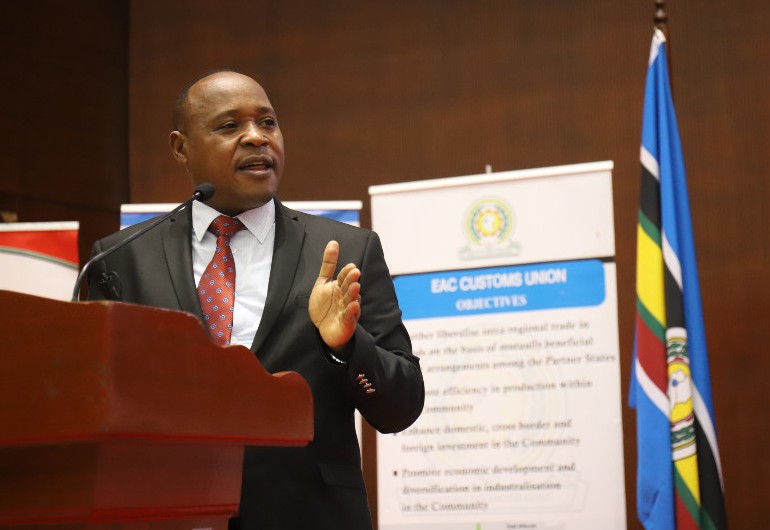Mathuki wants to see EAC back to complementary industrialisation
 Dr. Mathuki advised East African Community governments to look towards complementing their industrial bases rather than competing with each other and aim for competitiveness that will increase intra-EAC trade.
Dr. Mathuki advised East African Community governments to look towards complementing their industrial bases rather than competing with each other and aim for competitiveness that will increase intra-EAC trade.
Dr. Peter Mathuki, the East African Community (EAC) Secretary General, has advised EAC Partner States’ governments to look towards complementing their industrial bases rather than competing with each other and aim for regional competitiveness that will increase intra-EAC trade.
He said, “Instead of competing, EAC Partner States need to complement each other. Harnessing our comparative advantage by collectively improving infrastructure connectivity will fast-track regional development.”
Speaking early this week during the opening session of the East Africa Trade and Industrialization Week (EATIW 2021), held at the Julius Nyerere Convention Centre, in Dar es Salaam, Dr. Mathuki urged EAC Partner States’ governments to enhance industrial productivity and strengthen institutional frameworks and policies to accelerate economic growth in the region.
“Currently, manufacturing contributes to GDP a meagre 8.9%. To achieve the set target of 25% in 2032, there is a need for diversification of the manufacturing base and raising local value-added content resource-based exports,” he said.
The Secretary General called for promotion of rural industrialization through an agricultural development led industrialization strategy and strengthening of research, technology and innovation capabilities of all EAC Partner States, to foster structural transformation of the manufacturing sector and industrial upgrading.
As a strategy towards economic recovery amid Covid-19 in the region, Dr. Mathuki called upon EAC Partner States Governments to offer long-term stimulus packages for private sector development and sector-specific incentives for the established regional value chains such as cotton, textile and apparel, leather livestock and Agro-processing.
The Secretary General also reaffirmed EAC´s commitment to finalize the Common External Tariff (CET) before the end of 2021. hH said, “The EAC is committed to finalising the Common External Tariff (CET) by the end of the year, in a move set to promote the Community´s domestic industries & safeguard the region from international shocks.”
The 38th Meeting of the Sectoral Council of Ministers on Trade, Industry, Finance and Investment (SCTIFI), which was held on 26th May 2021, adopted a four-band CET structure (0%, 10% and 25%).
The Secretary General said emphasised the need for EAC Partner States governments to speed up the finalisation and implementation of EAC Regulations on liberalisation of air transport services, in a move set to lower flight costs and in turn reduce the cost of doing business in the region.
“With only about 2% of East Africans vaccinated, it is critical that the private sector leads deliberate public campaigns on Covid-19 vaccination and jointly to enhance EAC as an investment destination,” Dr. Mathuki said.
David Osiany, Chief Administrative Secretary in Kenya’s Ministry of Industrialization, Trade and Enterprise Development, called for consistent public-private sector dialogues and collaboration to develop policies corresponding with the current business environment.
Prof. Kitila Mkumbo, the Tanzania Minister for Industry and Trade, suggested for joint investment by EAC governments and the private sector in skills development. He said, “Only 50% of our workforce are employable in the current job market. The public-private sector should come up with a strategy on skills development to fill this gap.”
The East African Trade & industrialization week which officially commenced Monday will run up to the 3rd of September, 2021. The conference brings together business operators, policy makers, civil society leaders, international and UN organization leaders, academia from all avenues to address challenges and propose solutions to the changing role of business in the region and the continent.

 African Heads of state head to South Korea next week for Summit talks
African Heads of state head to South Korea next week for Summit talks
 Trading leads as main source of income for Ugandans
Trading leads as main source of income for Ugandans
 New leadership for bankers’ umbrella as total assets top $12 billion
New leadership for bankers’ umbrella as total assets top $12 billion
 Brussels Airlines to announce Nairobi service
Brussels Airlines to announce Nairobi service
 SITA promises enhanced travel experience after Materna acquisition
SITA promises enhanced travel experience after Materna acquisition
 Saudia’s 105 aircraft order stretches A320neo lead over rival Max
Saudia’s 105 aircraft order stretches A320neo lead over rival Max
